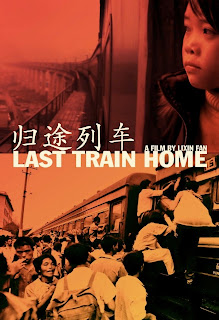I let myself get over-hyped about this one: Director
Anh Hung Tran's
The Vertical Ray of the Sun is one of the most beautiful films I've ever seen; Cinematographer
Ping Bin Lee, one of my favorites;
Jonny Greenwood doing the soundtrack. Almost every publicity blurb about this movie starts off with "
Upon hearing the song "Norwegian Wood," Toru remembers back to his life in the 1960s ..."
Well ... that blurb may describe the book but it has nothing to do with this film. I'm not a
Beatles fan but I do carry a bunch of love for that song and it does bring with it a great sense of nostalgia. Somebody paid somebody a bunch of money to play that song over the end credits, all for naught. There isn't any real sense of nostalgia in the film except for some of the fashion and the big telephones. I let myself be mislead.
Greenwood's soundtrack might be interesting to listen to by itself but in the film all the lilting strings manage to seem bombastic. I literally muted the film several times it annoyed me so much. I don't think this is Greenwood's issue, though. Tran has been known to over-saturate a film or two with torturing soundtracks (
The Scent of Green Papaya).
Ping Bin Lee did come through. There are many breathtakingly beautiful scenes in the film, a few of which played silently for me because of the aforementioned soundtrack's habit of shitting all over the film.
I do not like
Rinko Kikuchi's acting. I've seen her in a handful of films and while she gets some moments right, she often brings too much of her blonding international star self to roles (even before she had it) and I struggle to see a character beyond her personality. She whispers a lot which is a phony way to be dramatic done by people, strangely, desirous of attention. If they have your attention a little bit they can force you to double it by whispering. Fortunately she is only half the focus of the film. Texas born
Kiko Mizuhara is awesome as the main "other" girl, Midori, in Toru's life. She's cute, spunky, forward, sexually confident, and blunt, but comes off as merely an outline of a character. I wish the whole film were about her.
Ken'ichi Matsuyama, as Toru, is serviceable as the supposedly nostalgic one but hardly awesome enough to be a guy that three different girls just have to fuck. Gorgeous
Eriko Hatsune has a nearly film-stealing scene but that's about all we see of her.
The film contains some rather bold, and funny at the same time, sexual dialog, although it's a little sore-thumbish because the film is only punctuated with it. I loved it, and laughed, when Midori calls up Toru and says "My dad died. Will you take me to a porno film? The most perverse one." She also has a few moments describing to Toru how she'd like to be bedded by him which are entertaining.
Kikuchi's Naoko, after letting Toru know that she's too crazy with despair to sleep with him asks him if it's torture to have an unserviced erection: "I can help with that", she then offers. There is a good bit of sadness and mixed up desire in the film but the characters and the story aren't developed enough to see it as more than immature angst.
I think this film will appeal to teenagers and twenty-somethings who've read the
Haruki Murakami novel it's based upon because most of the holes in the film will be filled in and the sense of nostalgia might be there. Not that teenagers have a lot of nostalgia for the sixties but the film is about loss, and it is fairly good at presenting that—except the adolescent level of it is pretty thin. The film is NOT about
the way things were—the last few wonderful lines of the film and a Beatles tune can't save it. It's just a young-love story which lacks the depth to appeal to those not feeling the same way, i.e., older folks. Young people experiencing the whirlwind of sexual awakening, and or those who've had a friend commit suicide, might love it.
Norwegian Wood is a great looking film but not well written or acted, and since it is also quite slow moving I don't think it will engage general audiences who haven't read the book. It's not sexy enough nor smart enough.
★★★
Director:
Anh Hung Tran
Starring:
Rinko Kikuchi,
Ken'ichi Matsuyama, Tetsuji Tamayama,
Kiko Mizuhara, Reika Kirishima,
Eriko Hatsune
IMDb
Wikipedia
Asianmediawiki



















